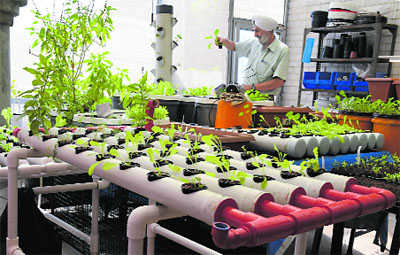
Jaspal Singh Anand in his soilless teraace garden in chandigarh
Charu Chhibber
Shrinking spaces as well as the vertical expansion of urban areas has lead to scarcity of space and land for gardening enthusiasts. In such a scenario many are exploring hydroponics or soilless gardening. This practice involves growing crops without the use of soil. It uses mineral nutrient solutions in a water solvent. Jaspal Singh Anand, a resident of Sector 33, Chandigarh, has been growing plants, including different varieties of exotic vegetables and fruits, in his terrace garden using this form of gardening. The retired Merchant Navy officer, who started gardening about three years back, is one of the very few practitioners in India of the ‘art’ of hydroponics agriculture.
In an exclusive tête-à-tête Anand elaborates on the intricacies of the multi-beneficial agricultural practice that has taken the world by storm and is slowly but surely garnering support in our country.
What is hydroponics?
Hydroponics is the method of growing plants without soil, using mineral nutrient solutions in a water solvent. Terrestrial plants are grown with only their roots exposed to the mineral solution, or the roots may be supported by an inert medium, such as cocopeat, leca balls, gravel, etc. The nutrients in hydroponics can be from fish waste, animals manure, or nutrients that can be easily bought from the market.
There are many ways to set up a hydroponic garden. Which one/s have you found to be the best and why?
Setting up a hydroponics garden is not too difficult. For a beginner the raft system is the best suited, as it is easy to maintain. Growth can be fairly decent. However, this system is best for greens — lettuce, spinach, celery etc grow well under this system.
For other vegetables, you need an inert medium, which can be cocopeat, leca balls etc. These basically hold the plant, while the nutrients are administered by dissolving these in water. This is basic, but works well with a little care.
What are the most important items you need for hydroponic gardening?
Clean water, good quality of nutrients and control over temperature, PH balance and electrical conductivity, to be done regularly.
What all plants (fruits and vegetables included) can be grown using this system?
Any crop can do well under hydroponics, depending on the medium. Root crops are usually not grown, but salad greens do well. I have grown a large variety of crops ranging from tomatoes, brinjal, spinach, cabbage, coriander, multiple varieties of lettuce, Italian parsley, basil, radish, sweet potato, oregano, strawberry, mulberry, guava, bok choy, aurugula, succulents, herbs, olives, fruits and lemons.
How do you determine the nutrient requirement of every plant and does the same nutrient work for a wide variety of plants?
Nutrients are very important. But the best part is that the same nutrients can be used for all crops. However, what varies is the concentration of individual nutrients for different varieties.
Where there are greens, you invariably get various types of insects/pests. How can these be dealt with?
For vegetables, the first safety from insects is a net house. I also hang sticky paper all over the green house as protection against the insects/pests.
How can one implement hydroponics gardening on a commercial scale?
Implementing hydroponics on a commercial scale is very doable. The input costs are higher, and as usual, vagaries of weather and market conditions decide the cost factor.
Finally, why hydroponics?
The biggest advantage is that crops grown under this system are absolutely free of chemicals, which is a rarity these days. The food grown not only tastes better and is more nutritious, you can monitor what goes into your food. You also know you are not adding to the environment degradation. Another added benefit is that this method helps you grow more in less space.
Other than that, hydroponics is proved to have several advantages over soil gardening. The growth rate on a hydroponic plant is faster than that of a soil plant grown under the same conditions. The yield is also greater.



























